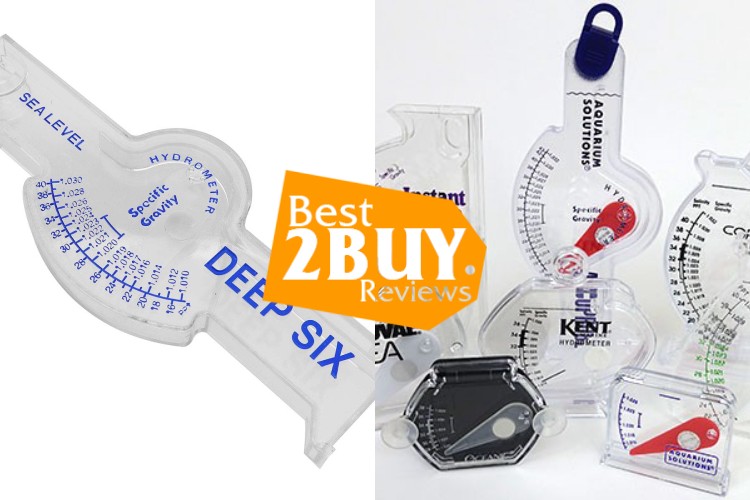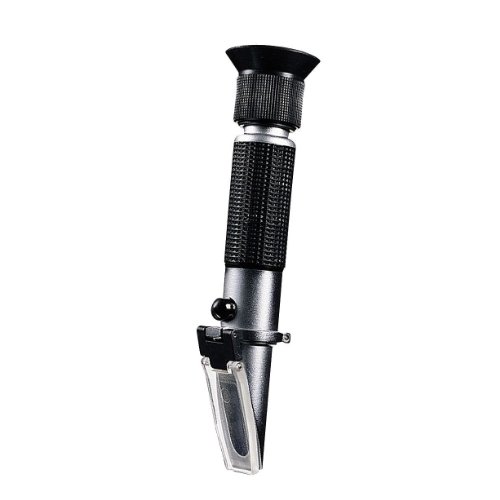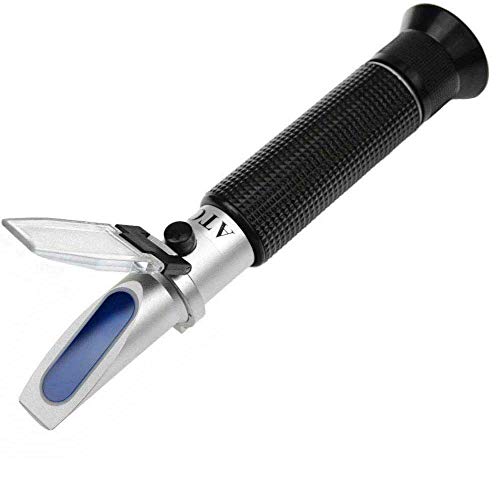Aquarium hydrometers are essential tools used to measure the specific gravity of the water in a fish tank or aquarium. Specific gravity is a measure of the density of a liquid compared to the density of water. It helps aquarium hobbyists monitor and maintain the salinity levels in saltwater aquariums, ensuring a stable and healthy environment for marine life.
- 1. What an aquarium hydrometer is used for?
- 1.1. Salinity Measurement
- 1.2. Osmoregulation
- 1.3. Water Quality Monitoring
- 1.4. Adjusting Salinity
- 1.5. Detecting Problems
- 1.6. Two main types of Aquarium hydrometers
- 1.7. Float Hydrometers
- 1.8. Refractometers
- 2. Why should buy Aquarium hydrometers?
- 2.1. Simple and Affordable
- 2.2. Measures Specific Gravity
- 2.3. Quick and Convenient
- 2.4. No Need for Batteries
- 2.5. Portable
- 2.6. Low Maintenance
- 2.7. Visual Reading
- 2.8. Limitations of Aquarium hydrometers ?
- 3. Tips for choosing Aquarium hydrometers
- 3.1. Type of Aquarium
- 3.2. Accuracy and Precision
- 3.3. Easy-to-Read Scale
- 3.4. Calibration
- 3.5. Durability and Build Quality
- 3.6. Maintenance
- 3.7. Brand Reputation and Reviews
- 3.8. Dual Scale (for saltwater)
- 3.9. Warranty
- 3.10. Budget
- 4. Tips for using effectively Aquarium hydrometers
- 4.1. Calibration
- 4.2. Cleanliness
- 4.3. Fill Level
- 4.4. Reading Level
- 4.5. Use in Proper Lighting
- 4.6. Temperature Compensation
- 4.7. Avoid Cross-Contamination
- 4.8. Multiple Readings
- 4.9. Monitor Salinity Regularly
- 4.10. Handle with Care
- 4.11. Replace if Necessary
- 4.12. Combine with Other Tests
- 5. In conclusion
What an aquarium hydrometer is used for?
Salinity Measurement
In saltwater aquariums, the specific gravity of the water is directly related to its salinity. Salinity is the concentration of dissolved salts, primarily sodium chloride (table salt), in the water. By measuring the specific gravity with a hydrometer, aquarium owners can determine the salinity level and ensure it remains within the appropriate range for the marine organisms they keep.
Osmoregulation
Marine fish, invertebrates, and corals have specific osmoregulatory needs, meaning they require a stable and consistent salinity level in their environment. Fluctuations in salinity can stress or harm these organisms. By using a hydrometer, aquarium hobbyists can keep the salinity at optimal levels, promoting good health and well-being of marine life.
Water Quality Monitoring
Maintaining the correct salinity is a crucial aspect of overall water quality management in saltwater aquariums. Proper salinity levels contribute to the overall stability of the aquarium, which is vital for the health and longevity of its inhabitants.
Adjusting Salinity
Aquarium hydrometers are also valuable tools when adding new saltwater or mixing water for water changes. By measuring the specific gravity, hobbyists can ensure they are adding the appropriate amount of salt mix to achieve the desired salinity.
Detecting Problems
Drastic changes in specific gravity readings might indicate issues with the water quality or improper mixing of saltwater. Regular monitoring with a hydrometer allows hobbyists to detect problems early on and take corrective action.
It's important to note that freshwater aquariums do not require specific gravity measurements, as the salinity remains relatively constant in freshwater systems. In freshwater setups, hobbyists focus on monitoring other water quality parameters like pH, ammonia, nitrite, and nitrate levels.
Two main types of Aquarium hydrometers
There are two main types of hydrometers commonly used in aquariums:
Float Hydrometers
Float hydrometers consist of a sealed glass tube with a weighted bulb at the bottom and a floating metering scale inside. The tube is placed vertically in the water, and the floating scale will rise or fall based on the specific gravity of the water. Users read the scale at the waterline to determine the specific gravity.
Refractometers
Refractometers are more advanced and accurate instruments for measuring specific gravity. They work based on the principle of light refraction through a prism. Users place a drop of aquarium water on the prism, and by looking through an eyepiece, they can read the specific gravity directly on a scale. Refractometers are widely favored for their precision and ease of use.

Why should buy Aquarium hydrometers?
Aquarium hydrometers offer several advantages, especially in saltwater aquariums, where maintaining the correct specific gravity is essential for the well-being of marine organisms. Here are some advantages of using aquarium hydrometers:
Simple and Affordable
Hydrometers are relatively simple tools, making them easy to use even for beginner aquarium hobbyists. They are also more affordable compared to more advanced equipment like refractometers.
Measures Specific Gravity
The primary function of hydrometers is to measure specific gravity accurately. Specific gravity is crucial in marine aquariums, as it indicates the salinity level of the water. Maintaining the right salinity is vital for the health and osmoregulation of marine fish, invertebrates, and corals.
Quick and Convenient
Hydrometers provide relatively quick readings, allowing aquarium owners to monitor salinity levels regularly without much effort.
No Need for Batteries
Hydrometers do not require batteries or power sources, making them always ready to use. This simplicity means they are less prone to malfunction or downtime.
Portable
Aquarium hydrometers are compact and easy to carry, making them convenient for both home and field use. This portability is beneficial for hobbyists who may need to measure salinity in quarantine tanks or other aquarium setups.
Low Maintenance
Hydrometers are generally easy to maintain. Regular cleaning and calibration are all that is needed to keep them functioning accurately.
Visual Reading
In the case of float hydrometers, the specific gravity reading is displayed visually, which is straightforward for users to interpret.
Limitations of Aquarium hydrometers ?
Despite their advantages, it's worth noting that there are some limitations to traditional float hydrometers. Refractometers have become increasingly popular due to their higher accuracy, ease of use, and the ability to provide more precise readings. Some of the advantages listed above might not apply to refractometers, but they offer superior performance for specific gravity measurements in saltwater aquariums. As a result, many experienced hobbyists and professionals prefer using refractometers over float hydrometers for more accurate and consistent readings.
Tips for choosing Aquarium hydrometers
When choosing an aquarium hydrometer, whether for a freshwater or saltwater aquarium, it's essential to consider various factors to ensure you get a reliable and accurate tool. Here are some tips to help you make the right choice:
Type of Aquarium
Determine whether you need a hydrometer for a freshwater or saltwater aquarium. Freshwater aquariums don't require specific gravity measurements, so in this case, you should focus on other water quality parameters. For saltwater aquariums, you'll need a hydrometer or refractometer to monitor the salinity levels.
Accuracy and Precision
Look for a hydrometer that provides accurate and consistent readings. Refractometers are generally more accurate than float hydrometers, but they might also be more expensive. High-quality refractometers are worth the investment if you're serious about maintaining precise salinity levels.
Easy-to-Read Scale
If you opt for a float hydrometer, choose one with a clear and easy-to-read scale. The markings should be visible at the waterline, allowing you to get accurate readings without difficulty.
Calibration
Consider whether the hydrometer is easy to calibrate. Regular calibration is crucial to maintain accuracy, especially for refractometers. Some models come with calibration solutions, making the process more convenient.
Durability and Build Quality
Choose a hydrometer made from sturdy materials that can withstand frequent use and potential accidental drops. Glass hydrometers are more fragile than plastic ones, so take this into account based on your handling habits.
Maintenance
Opt for a hydrometer that is easy to clean and maintain. Regular cleaning is necessary to prevent salt buildup and ensure accurate readings.
Brand Reputation and Reviews
Research the brand and read customer reviews to get an idea of the reliability and performance of the hydrometer. A reputable brand with positive reviews is more likely to provide a quality product.
Dual Scale (for saltwater)
If you're considering a refractometer for a saltwater aquarium, choose one with a dual scale that measures both specific gravity (SG) and salinity in parts per thousand (ppt). This versatility allows you to use either unit of measurement.
Warranty
Check if the hydrometer comes with a warranty. A warranty gives you confidence in the product's quality and provides support in case of any defects or issues.
Budget
Consider your budget, but also keep in mind that a slightly higher investment in a more accurate and reliable hydrometer can save you money in the long run by preventing potential inaccuracies and the need for replacements.
Remember that water quality is essential for the health of your aquarium inhabitants, and accurate measurement tools are critical for maintaining a stable environment. By choosing a suitable and reliable hydrometer, you'll be better equipped to ensure the well-being of your aquatic pets.
Tips for using effectively Aquarium hydrometers
Using aquarium hydrometers effectively is crucial to ensure accurate readings and maintain optimal conditions for your aquarium inhabitants, especially in saltwater setups. Here are some tips to help you use hydrometers effectively:
Calibration
Before using a new hydrometer or after cleaning, it's essential to calibrate it properly. Follow the manufacturer's instructions to calibrate the hydrometer using a calibration solution or distilled water. Regular calibration ensures accurate readings.
Cleanliness
Keep the hydrometer clean and free from salt residue or any contaminants that could affect its accuracy. Rinse the hydrometer with fresh water after each use and avoid touching the inside of the tube or prism with your fingers.
Fill Level
When using a float hydrometer, ensure that the water level reaches the appropriate mark on the scale. Avoid bubbles or water droplets on the surface, as they can interfere with the reading.
Reading Level
For float hydrometers, read the specific gravity at the waterline on the scale. Make sure you read it at eye level to avoid parallax errors.
Use in Proper Lighting
When using a refractometer, ensure you have adequate lighting to read the scale clearly through the eyepiece. Adjust the focus if necessary for a sharp image.
Temperature Compensation
Some refractometers come with automatic temperature compensation (ATC) to account for temperature variations. If your refractometer has this feature, it's crucial to follow the instructions for correct usage.
Avoid Cross-Contamination
If you're using the same hydrometer for both freshwater and saltwater aquariums, be extra cautious to prevent cross-contamination. Rinse the hydrometer thoroughly with freshwater before using it in a saltwater tank.
Multiple Readings
Take multiple readings and average them for better accuracy, especially with float hydrometers. Minor variations in reading are normal, and averaging them helps obtain a more reliable value.
Monitor Salinity Regularly
Check the salinity of your saltwater aquarium regularly, especially if you're making adjustments or changes to the system. Keeping a log of the specific gravity or salinity readings can help you identify trends and potential issues over time.
Handle with Care
Handle the hydrometer with care, especially if it's made of glass. Avoid dropping it or subjecting it to sudden temperature changes.
Replace if Necessary
Over time, hydrometers might wear out or lose accuracy. If you notice significant discrepancies in readings, consider replacing the hydrometer to ensure accurate measurements.
Combine with Other Tests
While hydrometers are useful for measuring salinity, they don't provide a complete picture of water quality. Regularly perform other essential water tests like pH, ammonia, nitrite, and nitrate levels to monitor the overall health of your aquarium.
By following these tips, you'll maximize the effectiveness of your aquarium hydrometer and ensure a stable and healthy environment for your aquatic pets. Remember that accuracy and consistency are key when using any measurement tool in your aquarium hobby.
In conclusion
Aquarium hydrometers is a essential tools for your aquariums. With our above instructions, we hope that you will find the best aquarium hydrometers and fit your budgets. Others, you also check our featured products. We evaluate basing on many factors as easy to use, sturdiness, package, accurancy, easy to read, buil quality, customer support, value for money. You also check in Amazon to find more products. We encourage you to read more and more reviews, expecially shopping online.










